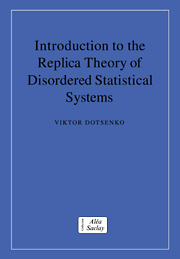Book contents
- Frontmatter
- Contents
- Preface
- 1 Introduction
- Part one Spin-glass systems
- 2 Physics of the spin-glass state
- 3 Mean-field theory of spin glasses
- 4 Physics of replica symmetry breaking
- 5 Ultrametricity
- 6 Experiments
- Part two Critical phenomena and quenched disorder
- Part three Other types of disordered system
- Bibliography
- Index
6 - Experiments
Published online by Cambridge University Press: 08 September 2009
- Frontmatter
- Contents
- Preface
- 1 Introduction
- Part one Spin-glass systems
- 2 Physics of the spin-glass state
- 3 Mean-field theory of spin glasses
- 4 Physics of replica symmetry breaking
- 5 Ultrametricity
- 6 Experiments
- Part two Critical phenomena and quenched disorder
- Part three Other types of disordered system
- Bibliography
- Index
Summary
In this chapter we will consider classical experiments that have been performed on real spin glass materials, aiming to check to what extent the qualitative picture of the spin-glass state described in previous chapters does take place in the real world. The main problem of the experimental observations is that the concepts and quantities that are very convenient in theoretical considerations are rather far from the experimental realities, and it is a matter of the experimental art to invent convincing experimental procedures that would be able to confirm (or reject) the theoretical predictions.
A series of such brilliant experiments has been performed by M. Ocio, J. Hammann, F. Lefloch and E. Vincent (Saclay), and M. Lederman and R. Orbach (UCLA) [9]. Most of these experiments have been done on the crystals CdCr1.7In0.3S4. The magnetic disorder there is present due to the competition of the ferromagnetic nearest neighbor interactions and the antiferromagnetic higher-order neighbor interactions. This magnet has already been systematically studied some time ago [26], and its spin-glass phase transition point T = 16.7 K is well established. Some of the measurements have been also performed on the metallic spin glasses AgMn [27] and the results obtained were qualitatively quite similar. It indicates that presumably the qualitative physical phenomena observed do not depend very much on the concrete realization of the spin-glass system.
- Type
- Chapter
- Information
- Publisher: Cambridge University PressPrint publication year: 2000



